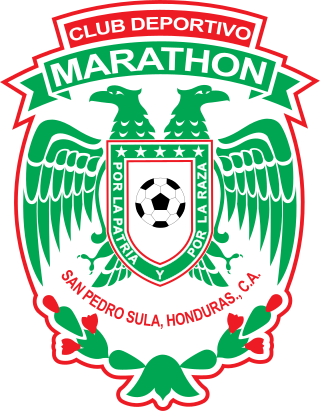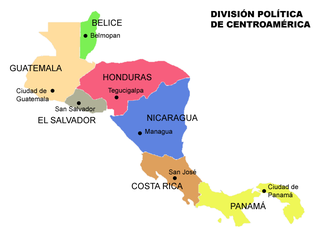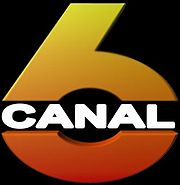
Barge often refers to a flat-bottomed inland waterway vessel which does not have its own means of mechanical propulsion. The first modern barges were pulled by tugs, but on inland waterways, most are pushed by pusher boats, or other vessels. The term barge has a rich history, and therefore there are many other types of barges.

Honduras, officially the Republic of Honduras, is a country in Central America. Honduras is bordered to the west by Guatemala, to the southwest by El Salvador, to the southeast by Nicaragua, to the south by the Pacific Ocean at the Gulf of Fonseca, and to the north by the Gulf of Honduras, a large inlet of the Caribbean Sea. Its capital and largest city is Tegucigalpa.

The Chesapeake and Ohio Canal, abbreviated as the C&O Canal and occasionally called the Grand Old Ditch, operated from 1831 until 1924 along the Potomac River between Washington, D.C. and Cumberland, Maryland. It replaced the Potomac Canal, which shut down completely in 1828, and could operate during months in which the water level was too low for the former canal. The canal's principal cargo was coal from the Allegheny Mountains.

Honduras is divided into 18 departments. Each department is headed by a governor, who is appointed by the President of Honduras. The governor represents the executive branch in the region in addition to acting as intermediary between municipalities and various national authorities; resolves issues arising between municipalities; oversees the penitentiaries and prisons in his department; and regularly works with the various Secretaries of State that form the President's Cabinet. To be eligible for appointment as a governor, the individual must: a) live for five consecutive years in the department; b) be Honduran; c) be older than 18 years of age and; d) know how to read and write.

Colón is a city and seaport in Panama, beside the Caribbean Sea, lying near the Atlantic entrance to the Panama Canal. It is the capital of Panama's Colón Province and has traditionally been known as Panama's second city. Originally it was located entirely on Manzanillo Island, surrounded by Limon Bay, Manzanillo Bay, and the Folks River; however, since the disestablishment of the Panama Canal Zone, the city's limits have been redefined to include Fort Gulick, a former U.S. Army base, as well as the former Panama Canal Zone towns of Cristobal, Margarita, and Coco Solo.

Club Deportivo Marathón is a Honduran professional football club based in San Pedro Sula. Founded on 25 November 1925, Marathón currently plays in the Liga Nacional de Fútbol Profesional de Honduras.

The Indian River is a 121-mile (195 km) long brackish lagoon in Florida. It is part of the Indian River Lagoon system, which in turn forms part of the Atlantic Intracoastal Waterway. It was originally named Rio de Ais after the Ais Indian tribe, who lived along the east coast of Florida, but was later given its current name.
Soto Cano Air Base is a Honduran military base 5 mi (8.0 km) to the south of Comayagua in Honduras. It houses 1,200–1,500 U.S. troops and is also used by the Honduran Air Force academy. The airbase became operational in 1940, changing the old location of the Honduras Air Force Academy in Toncontin, Tegucigalpa to Palmerola. It serves as one of the important bases to the US Military's presence in Central America.

The Estadio Nacional Chelato Uclés is a multi-purpose stadium in Tegucigalpa, Honduras. It is used mostly for association football matches. The stadium has a capacity of 35,000 and is the home of football clubs Motagua and Olimpia. This is one of the oldest stadiums in Honduras and has an important historical role for it, since emblematic matches in the history of Honduran Football have been held in this stadium, as well as concerts and presidential inaugurations.

The Banana Wars were a series of conflicts that consisted of military occupation, police action, and intervention by the United States in Central America and the Caribbean between the end of the Spanish–American War in 1898 and the inception of the Good Neighbor Policy in 1934. The military interventions were primarily carried out by the United States Marine Corps, which also developed a manual, the Small Wars Manual (1921) based on their experiences. On occasion, the United States Navy provided gunfire support and the United States Army also deployed troops.

Club Deportivo Real Juventud is a Honduran football club based in Santa Bárbara, Santa Bárbara.

Central America is a subregion of the Americas formed by six Latin American countries and one (officially) Anglo-American country, Belize. As an isthmus it connects South America with the remainder of mainland North America, and comprises the following countries : Belize, Guatemala, Honduras, El Salvador, Nicaragua, Costa Rica, and Panama.

Ricardo Gabriel Canales Lanza is a Honduran former footballer who plays as a goalkeeper.
Television in Honduras consists of both local channels and foreign television, normally distributed through cable.

This is an index of Central America-related articles. This index defines Central America as the seven nations of Belize, Costa Rica, El Salvador, Guatemala, Honduras, Nicaragua, and Panama.

The following is an alphabetical list of topics related to the Republic of Honduras.
Canal 11 is a nationwide television station in Honduras. It started broadcasting in November 1996 and it is a Grupo Continental company.
Canal 36 is a television station in Honduras. It was briefly closed down by order of the government of Roberto Micheletti on September 28, 2009 during the 2009 Honduran constitutional crisis, along with Radio Globo, because of its support for deposed President of Honduras Manuel Zelaya, but then was re-opened. It is owned by Esdras Amado Lopez.














